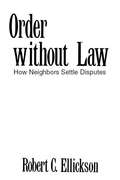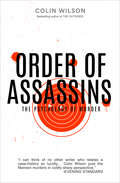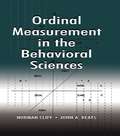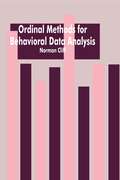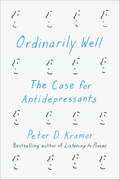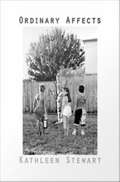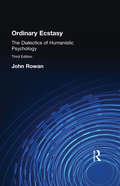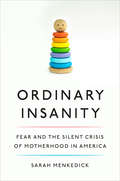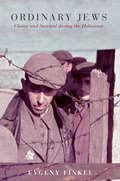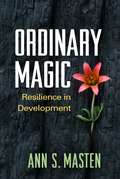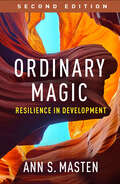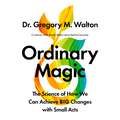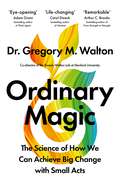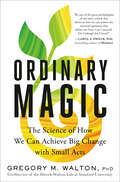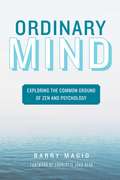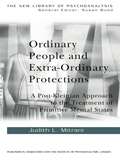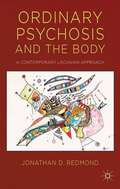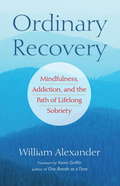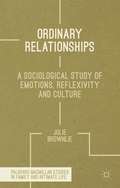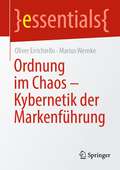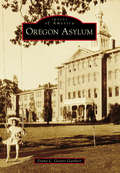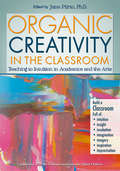- Table View
- List View
Order Without Law
by Robert C. EllicksonIn Order without Law Robert C. Ellickson shows that law is far less important than is generally thought. He demonstrates that people largely govern themselves by means of informal rules-social norms-that develop without the aid of a state or other central coordinator. Integrating the latest scholarship in law, economics, sociology, game theory, and anthropology, Ellickson investigates the uncharted world within which order is successfully achieved without law. The springboard for Ellickson's theory of norms is his close investigation of a variety of disputes arising from the damage created by escaped cattle in Shasta County, California. In "The Problem of Social Cost" --the most frequently cited article on law--economist Ronald H. Cease depicts farmers and ranchers as bargaining in the shadow of the law while resolving cattle-trespass disputes. Ellickson's field study of this problem refutes many of the behavioral assumptions that underlie Coase's vision, and will add realism to future efforts to apply economic analysis to law. Drawing examples from a wide variety of social contexts, including whaling grounds, photocopying centers, and landlord-tenant relations, Ellickson explores the interaction between informal and legal rules and the usual domains in which these competing systems are employed. Order without Law firmly grounds its analysis in real-world events, while building a broad theory of how people cooperate to mutual advantage.
Order in Chaos - Cybernetics of Brand Management (essentials)
by Oliver Errichiello Marius WernkeCybernetics is a science for understanding and systematically using information. As a subject of cybernetics, the brand is becoming increasingly important, especially in times of acceleration and infinite, global commodity markets. Only those who are able to preserve their patterns in the age of change and adapt them again and again to the requirements of the times will survive. Neither customer data nor creative ideas help here, but a sound knowledge of the structural functioning of all living beings - organic and social. By bringing together brand sociology and management cybernetics, this essential clarifies the invisible social forces of attraction. By illustrating the overarching dynamics of all (living) systems, universal insights can be gained and planned strategies developed.
Order of Assassins: The Psychology of Murder
by Colin WilsonAn examination of the motives for murder from the bestselling author of The Outsider—&“Colin Wilson puts the Manson murders in coldly sharp perspective&” (Evening Standard). Why is the &“motiveless&” murder an increasing phenomenon today? What is the mentality behind the Manson massacres and other shocking cases of brutal killing—too frequent to be written off as isolated cases? In his penetrating exploration of murder, Colin Wilson suggests that the apparently meaningless violence so frighteningly prevalent today is the result of boredom and frustration induced by a repressive society. Particular individuals of high creative potential are thwarted in their natural drives and ambitions and are forced to tread the deadly path of homicide. Colin Wilson traces this path, describing in detail many instances of violent crime, and provides valuable insights that may point to an explanation.
Order on the Edge of Chaos
by Edward J. LawlerOrder and stability are tenuous and fragile. People have to work to create and sustain a semblance of stability and order in their lives and in their organizations and larger communities. Order on the Edge of Chaos compares different ideas about how we coordinate and cooperate. The ideas come from 'micro-sociology', and they offer new answers to the classic question of Thomas Hobbes: 'how is social order possible?' The most common answers in sociology, political science, and economics assume a fundamental tension between individual and group interests. This volume reveals that social orders are problematic even without such tension, because when people interact with each other, they verify their identities, feel and respond to emotions, combine different goal frames, and develop shared responsibility. The ties of people to groups result from many aspects of their social interactions, and these cannot be explained by individual self-interest.
Ordinal Measurement in the Behavioral Sciences
by Norman Cliff John A. KeatsThis book provides an alternative method for measuring individual differences in psychological, educational, and other behavioral sciences studies. It is based on the assumptions of ordinal statistics as explained in Norman Cliff's 1996 Ordinal Methods for Behavioral Data Analysis. It provides the necessary background on ordinal measurement to permit its use to assess psychological and psychophysical tests and scales and interpret the data obtained. The authors believe that some of the behavioral measurement models used today do not fit the data or are inherently self-contradictory. Applications of these models can therefore lead to unwarranted inferences regarding the status of the derived variables. These methods can also be difficult to apply, particularly in small-sample contexts without making additional, unrealistic assumptions. Ordinal methods more closely reflect the original data, are simple to apply, and can be used in samples of any size. The book's approach is in essence a return to simple empiricism in psychological measurement. Ordinal Measurement in the Behavioral Sciences provides: *methods for analyzing test responses; *extensive discussions of ordinal approaches to analyzing data that are judgments of stimuli; *methods for treating psychological data in ways consistent with its ordinal nature so as to stimulate new developments in this area; and *ordinal test theory and the unfolding methods that are applicable to cross-cultural studies. Advanced students, researchers, and practitioners concerned with psychological measurement should find this book relevant. Measurement professionals will find it provides useful and simple methods that stimulate thought about measurement's real issues.
Ordinal Methods for Behavioral Data Analysis
by Norman CliffThis book was written with the belief that ordinal statistical methods--sometimes discussed under the title of "nonparametric statistics"--deserve much more serious attention as research tools than they have traditionally had. There are three classes of reasons for this: *Many behavioral variables constitute only ordinal scales, not interval measurements that are required for traditional statistics. *Various research issues that are of primary interest in behavioral research are themselves questions about order: Which group scores higher? Is the order on this variable similar to the order on that? *Inferences from ordinal statistics are less subject to distributional peculiarities of the data than are those from traditional statistics. Taking an innovative approach, this book treats ordinal methods in an integrated way rather than as a compendium of unrelated methods, and emphasizes that the ordinal quantities are highly meaningful in their own right, not just as stand-ins for more traditional correlations or analyses of variance. In fact, since the ordinal statistics have desirable descriptive properties of their own, the book treats them parametrically, rather then nonparametrically. The author discusses how ordinal statistics can be applied in a much wider set of research situations than has usually been thought, and that they can often come closer to answering the researcher's primary questions than traditional ones can. And he includes some extensions of ordinal methods in order to accomplish that end.
Ordinarily Well: The Case for Antidepressants
by Peter D. KramerDo antidepressants work, or are they glorified dummy pills? How can we tell?In Ordinarily Well, the celebrated psychiatrist and author Peter D. Kramer examines the growing controversy about the popular medications. A practicing doctor who trained as a psychotherapist and worked with pioneers in psychopharmacology, Kramer combines moving accounts of his patients’ dilemmas with an eye-opening history of drug research to cast antidepressants in a new light.Kramer homes in on the moment of clinical decision making: Prescribe or not? What evidence should doctors bring to bear? Using the wide range of reference that readers have come to expect in his books, he traces and critiques the growth of skepticism toward antidepressants. He examines industry-sponsored research, highlighting its shortcomings. He unpacks the “inside baseball” of psychiatry—statistics—and shows how findings can be skewed toward desired conclusions.Kramer never loses sight of patients. He writes with empathy about his clinical encounters over decades as he weighed treatments, analyzed trial results, and observed medications’ influence on his patients’ symptoms, behavior, careers, families, and quality of life. He updates his prior writing about the nature of depression as a destructive illness and the effect of antidepressants on traits like low self-worth. Crucially, he shows how antidepressants act in practice: less often as miracle cures than as useful, and welcome, tools for helping troubled people achieve an underrated goal—becoming ordinarily well.
Ordinary Affects
by Kathleen StewartOrdinary Affects is a singular argument for attention to the affective dimensions of everyday life and the potential that animates the ordinary. Known for her focus on the poetics and politics of language and landscape, the anthropologist Kathleen Stewart ponders how ordinary impacts create the subject as a capacity to affect and be affected. In a series of brief vignettes combining storytelling, close ethnographic detail, and critical analysis, Stewart relates the intensities and banalities of common experiences and strange encounters, half-spied scenes and the lingering resonance of passing events. While most of the instances rendered are from Stewart's own life, she writes in the third person in order to reflect on how intimate experiences of emotion, the body, other people, and time inextricably link us to the outside world. Stewart refrains from positing an overarching system--whether it's called globalization or neoliberalism or capitalism--to describe the ways that economic, political, and social forces shape individual lives. Instead, she begins with the disparate, fragmented, and seemingly inconsequential experiences of everyday life to bring attention to the ordinary as an integral site of cultural politics. Ordinary affect, she insists, is registered in its particularities, yet it connects people and creates common experiences that shape public feeling. Through this anecdotal history--one that poetically ponders the extremes of the ordinary and portrays the dense network of social and personal connections that constitute a life--Stewart asserts the necessity of attending to the fleeting and changeable aspects of existence in order to recognize the complex personal and social dynamics of the political world.
Ordinary Ecstasy: The Dialectics of Humanistic Psychology
by John RowanHumanistic Psychology ranges far and wide into education, management, gender issues and many other fields. Ordinary Ecstasy, first published in 1976, is widely regarded as one of the most important books on the subject. Although this new edition still contains much of the original material, it has been completely rethought in the light of postmodern ideas, with more emphasis on the paradoxes within humanistic psychology, and takes into account changes in many different areas, with a greatly extended bibliography.Ordinary Ecstasy is written not only for students and professionals involved in humanistic psychology - anyone who works with people in any way will find it valuable and interesting.
Ordinary Insanity: Fear and the Silent Crisis of Motherhood in America
by Sarah MenkedickA groundbreaking exposé and diagnosis of the silent epidemic of fear afflicting new mothers, and a candid, feminist deep dive into the culture, science, history, and psychology of contemporary motherhood Anxiety among mothers is a growing but largely unrecognized crisis. In the transition to motherhood and the years that follow, countless women suffer from overwhelming feelings of fear, grief, and obsession that do not fit neatly within the outmoded category of &“postpartum depression.&” These women soon discover that there is precious little support or time for their care, even as expectations about what mothers should do and be continue to rise. Many struggle to distinguish normal worry from crippling madness in a culture in which their anxiety is often ignored, normalized, or, most dangerously, seen as taboo. Drawing on extensive research, numerous interviews, and the raw particulars of her own experience with anxiety, writer and mother Sarah Menkedick gives us a comprehensive examination of the biology, psychology, history, and societal conditions surrounding the crushing and life-limiting fear that has become the norm for so many. Woven into the stories of women&’s lives is an examination of the factors—such as the changing structure of the maternal brain, the ethically problematic ways risk is construed during pregnancy, and the marginalization of motherhood as an identity—that explore how motherhood came to be an experience so dominated by anxiety, and how mothers might reclaim it. Writing with profound empathy, visceral honesty, and deep understanding, Menkedick makes clear how critically we need to expand our awareness of, compassion for, and care for women&’s lives.
Ordinary Jews: Choice and Survival during the Holocaust
by Evgeny FinkelFocusing on the choices and actions of Jews during the Holocaust, Ordinary Jews examines the different patterns of behavior of civilians targeted by mass violence. Relying on rich archival material and hundreds of survivors' testimonies, Evgeny Finkel presents a new framework for understanding the survival strategies in which Jews engaged: cooperation and collaboration, coping and compliance, evasion, and resistance. Finkel compares Jews' behavior in three Jewish ghettos—Minsk, Kraków, and Białystok—and shows that Jews' responses to Nazi genocide varied based on their experiences with prewar policies that either promoted or discouraged their integration into non-Jewish society. Finkel demonstrates that while possible survival strategies were the same for everyone, individuals' choices varied across and within communities. In more cohesive and robust Jewish communities, coping—confronting the danger and trying to survive without leaving—was more organized and successful, while collaboration with the Nazis and attempts to escape the ghetto were minimal. In more heterogeneous Jewish communities, collaboration with the Nazis was more pervasive, while coping was disorganized. In localities with a history of peaceful interethnic relations, evasion was more widespread than in places where interethnic relations were hostile. State repression before WWII, to which local communities were subject, determined the viability of anti-Nazi Jewish resistance.Exploring the critical influences shaping the decisions made by Jews in Nazi-occupied eastern Europe, Ordinary Jews sheds new light on the dynamics of collective violence and genocide.
Ordinary Magic
by Ann S. MastenFrom a pioneering researcher, this book synthesizes the best current knowledge on resilience in children and adolescents. Ann S. Masten explores what allows certain individuals to thrive and adapt despite adverse circumstances, such as poverty, chronic family problems, or exposure to trauma. Coverage encompasses the neurobiology of resilience as well as the role of major contexts of development: families, schools, and culture. Identifying key protective factors in early childhood and beyond, Masten provides a cogent framework for designing programs to promote resilience. Complex concepts are carefully defined and illustrated with real-world examples.
Ordinary Magic
by Ann S. MastenFrom a pioneering researcher, this book synthesizes the best current knowledge on resilience in children and adolescents. Ann S. Masten explores what allows certain individuals to thrive and adapt despite adverse circumstances, such as poverty, chronic family problems, or exposure to trauma. Coverage encompasses the neurobiology of resilience as well as the role of major contexts of development: families, schools, and culture. Identifying key protective factors in early childhood and beyond, Masten provides a cogent framework for designing programs to promote resilience. Complex concepts are carefully defined and illustrated with real-world examples.
Ordinary Magic: Resilience in Development
by Ann S. MastenFully updated with key advances in theory, methods, and research, the second edition of this landmark work features an expanded conceptual framework and a more global perspective on threats to human development, including climate change, war, poverty, racial injustice, and pandemics. Pioneering resilience expert Ann S. Masten illuminates the ordinary but powerful processes that allow many children exposed to trauma and adversity to survive, adapt, and even thrive. The book traces fundamental adaptive systems that have evolved and function synergistically at the neurobiological, psychological, social, community, and cultural levels. Using a range of case examples to illustrate complex concepts, Masten provides a cogent resilience framework for promoting positive development in children at risk. New to This Edition Advances in neurobiology, more international (including non-Western) findings and examples, new discussions of cultural identity development, up-to-date intervention research, and more. Heightened focus on the interactions of multiple systems--including families, schools, culture, and communities--in supporting children's resilience. Increased attention to the impact of structural inequality, poverty, and intergenerational trauma. Coverage of rapidly emerging threats--the risks posed to children by multisystem, cascading disasters, such as the COVID-19 pandemic.
Ordinary Magic: The Science of How We Achieve Big Change with Small Acts
by Gregory Walton'By one of the great psychologists of our time, a book that shows us how we can answer the universal questions that define our lives: Can I succeed? Do I belong? Am I loved?' Carol S. Dweck, bestselling author of MindsetDiscover simple psychological shifts that build trust, belonging, and confidence--from the co-director of the Dweck-Walton Lab at Stanford UniversityThe emotional questions we face can define our lives. If you're expecting an interaction to go wrong, that expectation can make it so. That's spiralling down. But as esteemed Stanford psychologist Greg Walton shows, when we see these questions clearly, we can answer them well. Known to social psychologists as wise interventions, these shifts in perspective can help us chart new trajectories for our lives. They help us spiral up.This is ordinary magic: The everyday experiences that help us set aside the ordinary worries of life to unleash extraordinary change.Through vivid storytelling and insightful analysis of fascinating research Dr. Walton pulls back the curtain to reveal the magic at work:- With our children: The few choice words from a parent or a teacher that builds trust and achievement.- In our relationships: How the right opportunity to reflect, for just a few minutes before a conflict conversation, can engender greater intimacy among couples--even a year later.- In school: How learning that everyone feels as out of place at first as you do at a new school--they really do--can unleash extraordinary potential, improving your life a decade later.- In our policy: how a one-page letter reduced recidivism among kids returning to school from juvenile detention by 40 percentage points; a postcard campaign cut suicide rates in half.It's easy to think problems are out of our control. But in fact, we have vast opportunities for change. Ordinary Magic puts the tools for change at your fingertips.
Ordinary Magic: The Science of How We Achieve Big Change with Small Acts
by Gregory Walton'By one of the great psychologists of our time, a book that shows us how we can answer the universal questions that define our lives: Can I succeed? Do I belong? Am I loved?' Carol S. Dweck, bestselling author of MindsetDiscover simple psychological shifts that build trust, belonging, and confidence--from the co-director of the Dweck-Walton Lab at Stanford UniversityThe emotional questions we face can define our lives. If you're expecting an interaction to go wrong, that expectation can make it so. That's spiralling down. But as esteemed Stanford psychologist Greg Walton shows, when we see these questions clearly, we can answer them well. Known to social psychologists as wise interventions, these shifts in perspective can help us chart new trajectories for our lives. They help us spiral up.This is ordinary magic: The everyday experiences that help us set aside the ordinary worries of life to unleash extraordinary change.Through vivid storytelling and insightful analysis of fascinating research Dr. Walton pulls back the curtain to reveal the magic at work:- With our children: The few choice words from a parent or a teacher that builds trust and achievement.- In our relationships: How the right opportunity to reflect, for just a few minutes before a conflict conversation, can engender greater intimacy among couples--even a year later.- In school: How learning that everyone feels as out of place at first as you do at a new school--they really do--can unleash extraordinary potential, improving your life a decade later.- In our policy: how a one-page letter reduced recidivism among kids returning to school from juvenile detention by 40 percentage points; a postcard campaign cut suicide rates in half.It's easy to think problems are out of our control. But in fact, we have vast opportunities for change. Ordinary Magic puts the tools for change at your fingertips.
Ordinary Magic: The Science of How We Can Achieve Big Change with Small Acts
by Gregory M. Walton PhD&“By one of the great psychologists of our time, a book that shows us how we can answer the universal questions that define our lives: Can I succeed? Do I belong? Am I loved?&”—Carol S. Dweck, PhD, bestselling author of Mindset Discover simple psychological shifts that build trust, belonging, and confidence—from the co-director of the Dweck-Walton Lab at Stanford University The emotional questions we face can define our lives. If you&’re expecting an interaction to go wrong, that expectation can make it so. That&’s spiraling down.But as esteemed Stanford psychologist Greg Walton shows, when we see these questions clearly, we can answer them well. Known to social psychologists as wise interventions, these shifts in perspective can help us chart new trajectories for our lives. They help us spiral up.This is ordinary magic: The ordinary experiences that help us set aside the ordinary worries of life to unleash extraordinary change.Through vivid storytelling and insightful analysis of fascinating research—both his own and others&’—Dr. Walton pulls back the curtain to reveal the magic at work:• With our children: The few choice words from a parent or a teacher that builds trust and achievement.• In our relationships: How the right opportunity to reflect, for just a few minutes before a conflict conversation, can engender greater intimacy among couples—even a year later.• In school: How learning that everyone feels as out of place at first as you do at a new school—they really do—can unleash extraordinary potential, improving your life a decade later.• In our policy: how a one-page letter reduced recidivism among kids returning to school from juvenile detention by 40 percentage points; a postcard campaign cut suicide rates in half.It&’s easy to think problems are out of our control. But in fact, we have vast opportunities for change. Ordinary Magic puts the tools for change at your fingertips.
Ordinary Mind
by Charlotte Joko Beck Barry MagidIs meditation an escape from--or a solution to--our psychological problems? Is the use of antidepressants counter to spiritual practice? Does a psychological approach to meditation reduce spirituality to "self-help"? What can Zen and psychoanalysis teach us about the problems of the mind and suffering? Psychiatrist and Zen teacher Barry Magid is uniquely qualified to answer questions like these. Written in an engaging and witty style, Ordinary Mind helps us understand challenging ideas--like Zen Buddhism's concepts of oneness, emptiness, and enlightenment--and how they make sense, not only within psychoanalytic conceptions of mind, but in the realities of our lives and relationships. This new paper edition of Magid's much-praised book contains additional case study vignettes.
Ordinary People and Extra-ordinary Protections: A Post-Kleinian Approach to the Treatment of Primitive Mental States (The New Library of Psychoanalysis #Vol. 40)
by Judith L. MitraniMany people come to analysis appearing quite 'ordinary' on the surface. However, once below that surface, we often come into contact with something quite unexpected: 'extra-ordinary protections' created to keep at bay any awareness of deeply traumatic happenings occurring at some point in life. Judith Mitrani investigates the development and the function of these protections, allowing the reader to witness the evolution of the process of transformation, wherein defensiveness steadily mutates into communication. She lucidly and artfully weaves detailed clinical with a variety of analytic concepts, and her original notions - including 'unmentalized experience' and its expression in enactments; 'adhesive pseudo-object relations' and the way in which this contracts and compares with normal and narcissistic object relations - provide valuable tools for understanding the infantile transference/countertransference and for the refinement of our technique with primitive mental states. Ordinary People and Extra-Ordinary Protections will prove stimulating and accessible in its style and substance to a broad analytic readership, from the serious student of psychoanalysis to the most seasoned professional.
Ordinary Psychosis and The Body
by Jonathan D. RedmondCurrent Lacanian ideas on psychosis have much to contribute to the complex and often surprising forms of psychotic symptomatology encountered in clinical practice. By focussing on the unique experience of individuals with psychosis, this book examines the centrality of body phenomena to both the onset and stabilisation of psychosis.
Ordinary Recovery: Mindfulness, Addiction, and the Path of Lifelong Sobriety
by William Alexander Kevin GriffinThe key to ongoing freedom from alcoholism or any other kind of addiction is right before us, here and now, in the ordinary and perfect present moment. The problem is that addictions are often the result of our efforts to escape living in the present in the first place. Bill Alexander's unique approach uses mindfulness, story, and meditation to help alcoholics and others learn to come back to the present moment and find healing there.Emerging scientific research suggests that mindfulness (a nonjudgmental awareness of our moment-to-moment experience) can help prevent addiction relapse. Ordinary Recovery is a revised edition of Alexander's book Cool Water, with a new foreword, a new preface by the author, updates throughout the book, and a new resources section.
Ordinary Relationships
by Julie BrownlieRecent theorizing tends to position ordinary relationships as something we have lost, yet the nature of these relationships is not seriously engaged with. Drawing on rich empirical data, this book questions epochal claims about contemporary emotional lives, setting out to be explicit about the nature of ordinary relationships.
Ordnung im Chaos – Kybernetik der Markenführung (essentials)
by Oliver Errichiello Marius WernkeDie Kybernetik ist eine Wissenschaft, um Informationen zu verstehen und systematisch zu nutzen. Als Thema der Kybernetik wird die Marke gerade in Zeiten der Beschleunigung und der unendlichen, globalen Warenmärkte zunehmend wichtiger. Denn Bestand hat nur, wer vermag, sein Muster im Zeitalter der Veränderung zu bewahren und immer wieder an die Erfordernisse der Zeit anzupassen. Dabei helfen weder Kundendaten noch kreative Ideen, sondern eine fundierte Kenntnis der strukturellen Funktionsweise aller Lebewesen – organischer und sozialer. Durch die Zusammenführung von Markensoziologie und Management-Kybernetik werden in diesem essential die unsichtbaren sozialen Anziehungskräfte verdeutlicht. Indem die übergreifenden Dynamiken aller (lebenden) Systeme dargestellt werden, lassen sich universelle Erkenntnisse gewinnen und planvolle Strategien entwickeln.
Oregon Asylum
by Diane L. Goeres-GardnerThe Oregon State Insane Asylum was opened in Salem on October 23, 1883, and is one of the oldest continuously operated mental hospitals on the West Coast. In 1913, the name was changed to the Oregon State Hospital (OSH). The history of OSH parallels the development and growth in psychiatric knowledge throughout the United States. Oregon was active in the field of electroshock treatments, lobotomies, and eugenics. At one point, in 1959, there were more than 3,600 patients living on the campus. The Oscar-winning movie One Flew Over the Cuckoo's Nest was filmed inside the hospital in 1972. In 2008, the entire campus was added to the National Register of Historic Places, and the state began a $360-million restoration project to bring the hospital to modern standards. The story of OSH is one of intrigue, scandal, recovery, and hope.
Organic Creativity in the Classroom: Teaching to Intuition in Academics and the Arts
by Jane PiirtoOrganic Creativity in the Classroom demonstrates an approach to teaching creatively-teaching to intuition-that is written by experienced, award-winning classroom teachers. Instead of focusing on divergent production skills such as fluency and flexibility, an outdated approach that dominates the field of creativity studies, this book includes helpful strategies that can be used to encourage students to become more creative within a specific domain. Teachers of writing, mathematics, science, social science, literature, foreign language, theater, songwriting, psychology, comparative religion, and arts education, among other domains, who infuse creativity and intuition into their classrooms share their practical advice using an insightful storytelling approach.
